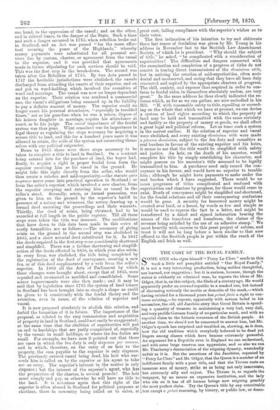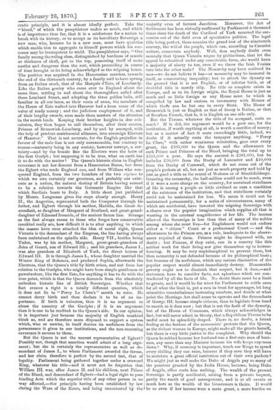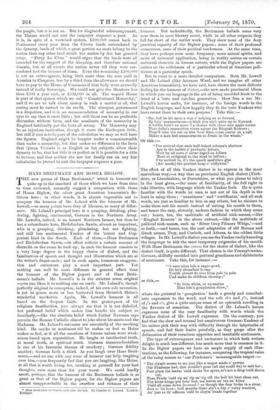THE COST OF THE ROYAL FAMILY.
SOME ONE who signs himself " Percy Le Clerc " sends us this week a little red pamphlet entitled " Our Royal Family." It is not a very interesting production, being neither thoughtful, nor learned, nor suggestive ; but it is curious, because, though the writer is evidently an educated man, he repeats the ideas of Mr. Odger, that is, on this subject, the libels of a century ago. He would apparently prefer an avowed republic to a masked one, but instead of discussing seriously the merits or demerits of the mask,—which having existed for a thousand years has primer facie a right to con- tinue existing,—he repeats, apparently with serious belief in his accusation, the old, old Jacobite story that Great Britain is spend- ing a quantity of treasure in maintaining a very bad, very dull, and very prolific German family of no particular mark, and with no especial claim to the historic reverence of the British people. At another time, we should not be concerned to answer him, but Mr. Odger's speech has surprised and troubled us, showing, as it does, how the old tradition which everybody believed to be dead yet lingers among classes which have become extremely powerful. An argument for a Republic even in England we can understand, and with some large reserves can appreciate, and so also we can Mr. Thackeray's denunciation of the reigning dynasty, wretchedly unfair as it is. But the assertions of the Jacobites, repeated by " Percy Le Clerc" and Mr. Odger, that the Queen is a member of an indifferent family with a poor title, and that the Throne costa an immense sum of money, strike t13 as being not only inaccurate, but extremely silly and unjust. The Throne is, as regards the taxpayer, by no means an expensive institution, and the lady who site on it has of all human beings now reigning possibly the most perfect claim. Try the Queen's title by any conceivable test except a priori reasoning, by history, or public law, or demo-
cratic principle, and it is almost ideally perfect. Take the " blood," of which the pamphleteer makes so much, and which is of importance thus far, that it is a misfortune for a nation to break with its history, or to accept as its hereditary Sovereign a new man, who, because he is a new man, must have qualities which enable him to aggregate to himself powers which his suc- cessor may be incompetent to wield. The pamphleteer says, " One family among the ruling class, distinguished by hardness of muscle or thickness of skull, got to the top, possessing itself of more castles and dungeons than the rest, which proceeding in course of time brought to its being acknowledged as the reigning house. The position was acquired in the Hanoverian marshes, towards the end of the thirteenth century, by a family said to have sprung from an Italian stock, that of the Marquis d'Este, of Lombardy. Like the Italian gentry who came over to England about the same time, settling in and about the thoroughfare called after them Lombard Street, and adopting the three golden balls, still familiar in all our lanes, as their coats of arms, the members of the House of Este wafted into Hanover had a keen sense of the value of ready money ; and the judicious employment of it, and -of their lengthy swords, soon made them masters of the situation in the marsh lands. Keeping their brother knights in due sub- mission, they then began to call themselves, after their estates, Princes of Brunswick-LUneburg, and by and by emerged, with the help of prudent matrimonial alliances, into sovereign Electors
• of Hanover." That is not accurate, for the English prejudice in favour of the male line is not only unreasonable, but contrary to reason—maternity being in any society, however corrupt, a cer- tainty—and by the female line the Electors were the heirs of the first Guelph ; but supposing it to be true, what on earth has -it to do with the matter? The Queen's historic claim to English reverence is not her descent from a Hanoverian Baron, but from the Egbert who made England one, and from William who con- quered England, from the two founders of the two regimes to which we owe certainly our greatness, and probably our exist- ence as a nation, the natural destiny of Britain having seemed to be a relation towards the Germanic Empire like that which Sardinia bears to Italy. A little sheet just published ;by Messrs. Longmans gives the steps clearly enough. Henry II., the Angevine, represented both the Conqueror through his ;father, and Egbert through his mother, Matilda, the direct de- scendant, as daughter of Margaret of Scotland, and great-grand- daughter of Edmund Ironside, of the ancient Saxon line. Strange as the fact always seems to those who forget how conservative -mankind really are, how difficult it is to alter anything to which the masses have once attached the idea of moral right, Queen Victoria is the descendant of the Empress, the line having always
• been maintained on the spindle side. Henry VII., besides being "Tudor, was by his mother, Margaret, great-great-grandson of John of Gaunt, son of Edward III. ; and his grandson, James I., was also grandson of Elizabeth of York, the direct heiress of Edward III. It is through James I., whose daughter married the Winter King of Bohemia, and produced Sophia, afterwards the Electress, that the Queen's title by birth arises, and not from her relation to the Guelphs, who might have been simple gentlemen or pawnbrokers, like the first Este, for anything it has to do with the true point, which is that the Queen descends from the absolutely -unbroken historic line of British Sovereigns. Whether that fact creates a right is a totally different question, which it does not lie in " Percy Le Clerc's " mouth to raise. He -cannot decry birth and then declare it to be of no im- portance. If birth is valueless, then it is no argument to abuse the ancestry of the Guelphs ; if it is an argument then it is one to be credited to the Queen's side. In our opinion, it is important just because the majority of English mankind think so, and are therefore more disposed to support a system which, wise or unwise, in itself derives its usefulness from the permanence it gives to our institutions, and the non-reasoning reverence it secures to them.
But the Queen is not the nearest representative of Egbert? Possibly not, though that assertion would admit of a long argu- ment; but she is certainly the representative as well as de- scendant of James I., to whom Parliament awarded the throne, and her claim therefore is perfect by the second test, that of legality. Parliament being gathered together under a crowned King, whatever his title—and it must not be forgotten that William III. was, after James II. and his children, next Prince of the Blood, and descendant of Egbert—had a legal right to pass binding Acts which the superior title of any other person in no way affected,—that principle having been established by law during the Wars of the Roses, and being uncontested by the
majority even of fervent Jacobites. Moreover, the Act of Settlement has been virtually reaffirmed by Parliament a thousand times since the death of the Cardinal of York removed the suc- cession out of the field even of speculative politics. The legal title being perfect, there remains the grand test of the nineteenth century, the will of the people, which can, according to Ctesarist writers, consecrate anybody. Well, does anybody doubt even mentally that Queen Victoria reigns by plebiscitum, that let the appeal be submitted under any conceivable form, she would have a majority of ninety to ten, even if we throw the Irish Fenian vote into the other scale? The Monarchy may have outlived its uses—we do not believe it has—or monarchy may be immoral in itself, as consecrating inequality; but to attack the dynasty on the ground that it is not English, or of inferior birth, or of doubtful title is merely silly. No title so complete exists in Europe, and as to its foreign origin, the Royal House is just as much and as little foreign as any House must be which is compelled by law and custom to intermarry with Houses of which thefe can be but one in every State. The House of Brunswick is just as English as that of Savoy is Italian, or that of Bourbon French, that is, it is English on one side only.
But the Throne, whatever the title of its occupant, costs so much ? If it did, the argument would be a poor one, for the institution, if worth anything at all, is worth a sacrifice of money; but as a matter of fact it costs exceedingly little, indeed, we doubt if it actually costs the taxpayer anything. " Percy Le Clerc," with rather wearisome reiteration, goes over every grant, the £385,000 to the Queen and the allowances to each Prince and Princess of the Blood, bringing the total up to £511,000 a year. He says the amount is £581,000, but he includes £30,000 from the Duchy of Lancaster and £40,000 from the Duchy of Cornwall, which do not come out of the people's pockets at all, but are just as much property and held by just as good a title as the rental of Woburn or of Strathfieldsaye. Granting the monarchy, the half-million would not be much, even if it were a mere charge on the country, for sustained stateliness of life is among a people so little civilized as ours a condition of the existence of the institution, and that stateliness certainly could not be maintained for less. We mean it could not be maintained permanently, for a series of circumstances, many of which are accidental, have invested the reigning Sovereign with a charm over the popular imagination which supplies all that is wanting in the external magnificence of her life. The income allowed the Sovereign is less than that of many of the nobles among whom she must live—for Englishmen would not endure either a " citizen" Court or a professional Court — and the allowances to the Princes are, as a rule, inadequate to the observ- ances required of them. Princes might be dispensed with, no doubt ; but Princes, if they exist, can in a country like this neither work for their living nor give themselves up to heiress- hunting. It may be very unphilosophical to prevent them, but then monarchy is not defended because of its philosophical basis ; but because of its usefulness, which any serious diminution of the popular respect would almost immediately destroy. Honourable poverty ought not to diminish that respect, but it doea,—and statesmen have to consider facts, not aphorisms which are con- tradicted by all the facts of life. No doubt there must be a limit to grants, and it would be far wiser for Parliament to settle once for all what the limit is, put a sum in trust for appanages, let long minorities counterbalance increasing numbers, and decide at what point the Marriage Act shall cease to operate and the detcendants of George III. become simple citizens, than to legislate from hand to mouth as it does now ; but that is not the fault of the dynasty, but of the House of Commons, which always acknowledges in fact, but will never admit in theory, that a Republican Throne to be useful must be splendidly draped. There is, no doubt, a latent feeling at the bottom of the economists' protests that the Queen, as the richest woman in Europe, might make all the grants herself, but there is very little justice in the complaint. Why should the Queen be robbed because her husband was a first-rate man of busi- ness, any more than any Minister because his wife keeps expenses down ? Why, if economy is important, teach our Kings to spend every shilling they can raise, because if they save they will have to maintain a great official institution out of their own pockets? We might just as well make the Duke of Argyle pay so many of the pensions granted by the India House, because, being Duke of Argyle, office costs him nothing. The wealth of the present Sovereign is partly accidental, arising from a private bequest, partly the result of good management, and is at all events as much hers as the wealth of the Grosvenors is theirs. It would be so even if her income were a mere grant, a mere burden on
the people, but it is not so. But for disgraceful mismanagement, the Throne would not cost the taxpayer sixpence a year. As it is, in spite of a wretched system, £300,000 comes back to Parliament every year from the Crown lands surrendered by the dynasty, lands of which a great portion no more belong to the nation than any other land which the nation by Act has granted away. " Percy Le Clerc " would argue that the lands were all intended for the support of the kingship, and therefore national domain, but at all events the nation never till they were sur- rendered had the income of them. Even the remaining £200,000 is not an extravagance, being little more than the sum paid in America to Congress, less by a third than the allowance we should have to pay to the House of Commons if that body were avowedly instead of really Sovereign. We could not give the Members less than £500 a year each, or £332,000 in all. The unpaid House is part of that system which we call " Constitutional Monarchy," and if we are to talk about money in such a matter at all, that saving must be carried to its credit. The cheapest, government is a despotism, and it is no recommendation of monarchy in our eyes to say that it costs little ; but still there can be no profitable discussion without facts, and the assailants of the monarchy in England habitually put the facts all wrong. The Monarchy may be an injurious institution, though it costs the Exchequer little, but still if cost is to be part of the calculation we may as well have the figures. England might be happier under a commonwealth than under a monarchy, but that makes no difference to the facts that Queen Victoria is as English as her subjects allow their dynasty to be, that her title is as perfect as it is possible for a title to become, and that neither she nor her family can on any fair calculation be proved to cost the taxpayer sixpence a year.




































 Previous page
Previous page